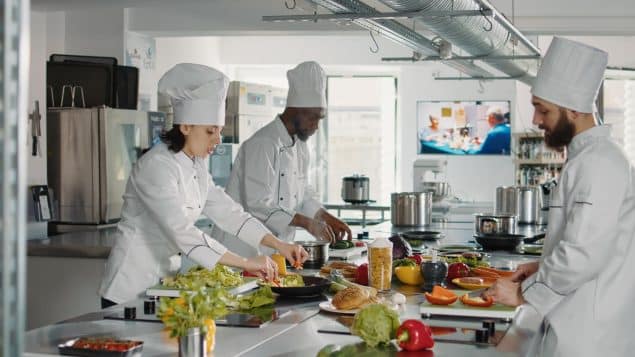Home » UK Employment news » Burns, assaults, 20-hour days – Michelin star chefs reveal horrors of life in top-class kitchens
Burns, assaults, 20-hour days – Michelin star chefs reveal horrors of life in top-class kitchens
https://www.whatjobs.com/news/united-kingdom/uk-employment-news/burns-assaults-20-hour-days-michelin-star-chefs-reveal-horrors-of-life-in-top-class-kitchens

By Nagasunder in UK Employment news, posted January 23, 2023

Top-class chefs face "extreme suffering" including burns and assaults to create award-winning food, a new study has found.
Researchers found Michelin Star chefs often find themselves hurt themselves on hot stoves and are even dropping their hands into deep-fat fryers to prove themselves.
One said going on shift felt like "going to war".
READ MORE: GETTING STAFF BACK IN THE OFFICE NOT A PRIORITY FOR US CEOS, SURVEY REVEALS
However, the study also discovered that many chefs continue to view the pain and misery as "a medal of honour".
Cardiff University and Emlyon Business School in France conducted the study, which is based on the anonymous accounts of 62 Michelin-starred chefs working in the UK and abroad.
Many spoke about being physically mistreated and bullied from the beginning of their careers; one junior chef spoke of being "trapped in fridges, assaulted, and kicked about."
READ MORE: NEW SURVEY SHOWS A THIRD OF STRUGGLING UK HOUSEHOLDS WOULD STRUGGLE TO FIND EXTRA £20
He said: "At such a young age I was in a position where I felt very lonely. I was really exhausted. I wasn't used to the abuse I was getting."
Some chefs said they were regularly exposed to endurance tests, like peeling "up to 150 fresh langoustines every day with our bare hands."
They added: "That would basically rip your hands to shreds because they're extremely sharp."
READ MORE: THE WORLDCOM SCANDAL THAT SAW CEO JAILED FOR 25 YEARS
One person claimed that if they made mistakes, food would be thrown in their face.
Some young chefs said they experienced episodes of vomiting and diarrhoea before starting their shifts because of the pressure.
Others said kitchen shifts lasted 20 hours.
Another chef described how his boss "picked up his bread knife from the middle of the kitchen" and "just had it to my neck in front of everyone."
READ MORE: ELON MUSK POLLS TWITTER USERS ON WHETHER HE SHOULD QUIT AS CEO
He was then elevated to a three-star Michelin restaurant after that ordeal.
In one case, a chef offered the researcher a tour of the restaurant's backstage spaces, where they found chefs sleeping.
But despite that level of pressure, researchers said for many, "a body marked by cuts and burns... was something to be celebrated."
READ MORE: CITIGROUP RAISES PAY FOR MOST OF ITS JUNIOR BANKERS AT A TIME OF MASS LAYOFFS
The academics said: "For many of our chefs, it was the right kind of body to have - it was the body of a committed, hard-working, tough chef."
Because of this attitude, many continued working even when they were injured.
One chef said: "I stabbed myself between my fingers with a knife many years ago. Blood was pulsing out. I just wrapped it with a tea towel [and carried on]," one said.
Need Career Advice? Get employment skills advice at all levels of your career
Another said burn marks and cuts on their colleagues were taken as "a good indicator that they're working under some sort of pressure".
They said "I mean, we always turned it around... you gave it some sort of, positive [spin].
"You knew the reality was your bloody suffering and it's horrible and horrendous, but you couldn't let it in. You can't do that."
In documentaries like The Menu and Boiling Point, which have gained critical praise for their examination of the fine dining process, the demanding working environment in elite kitchens has been brought to light.
To combat what it called a "playground bullying" culture, the UK's chef's union, Unicef, told the Guardian that the tales showed the need for more diversity in kitchens, particularly more women.
Source: BBC News
Follow us on YouTube, Twitter, LinkedIn, and Facebook.










